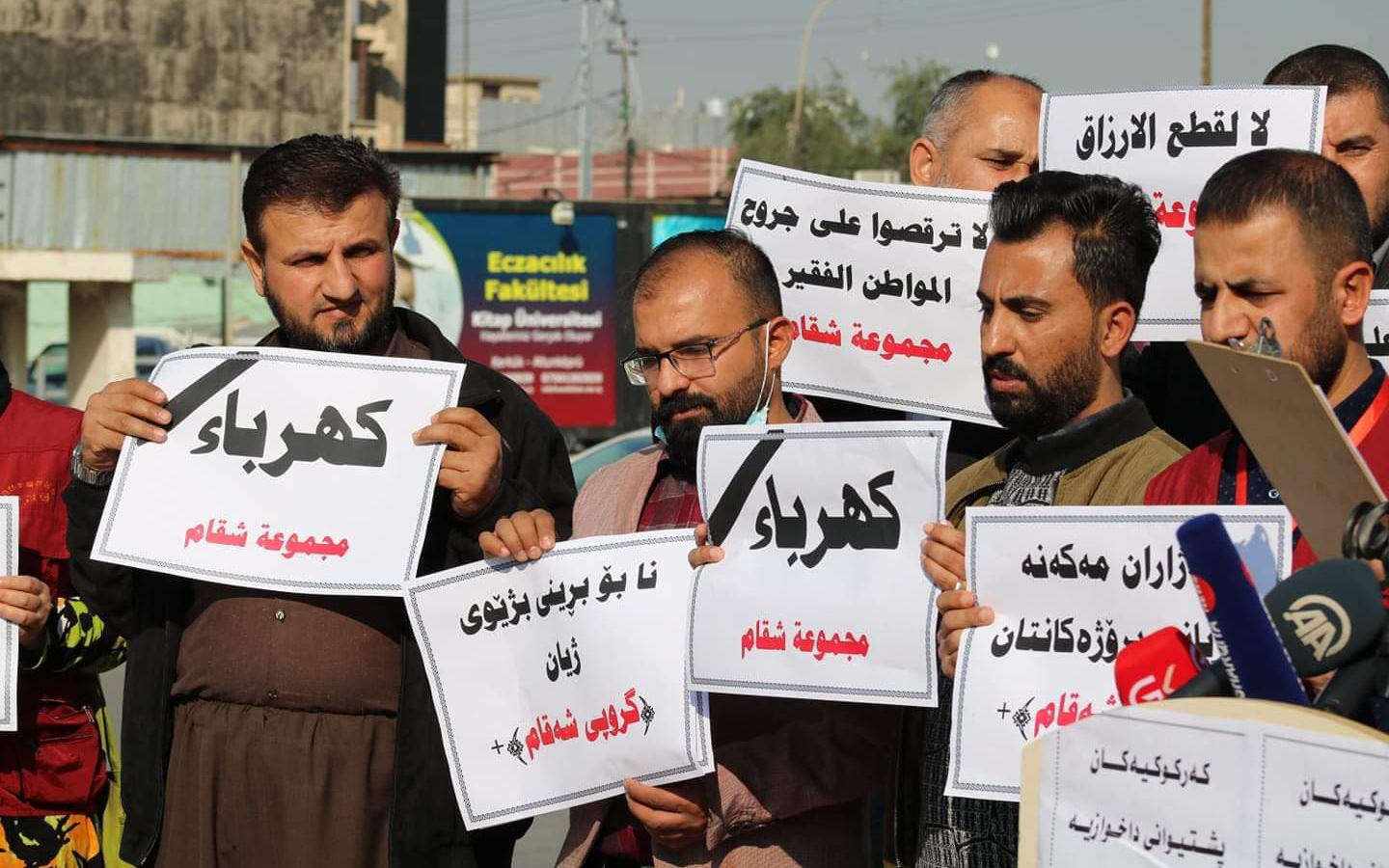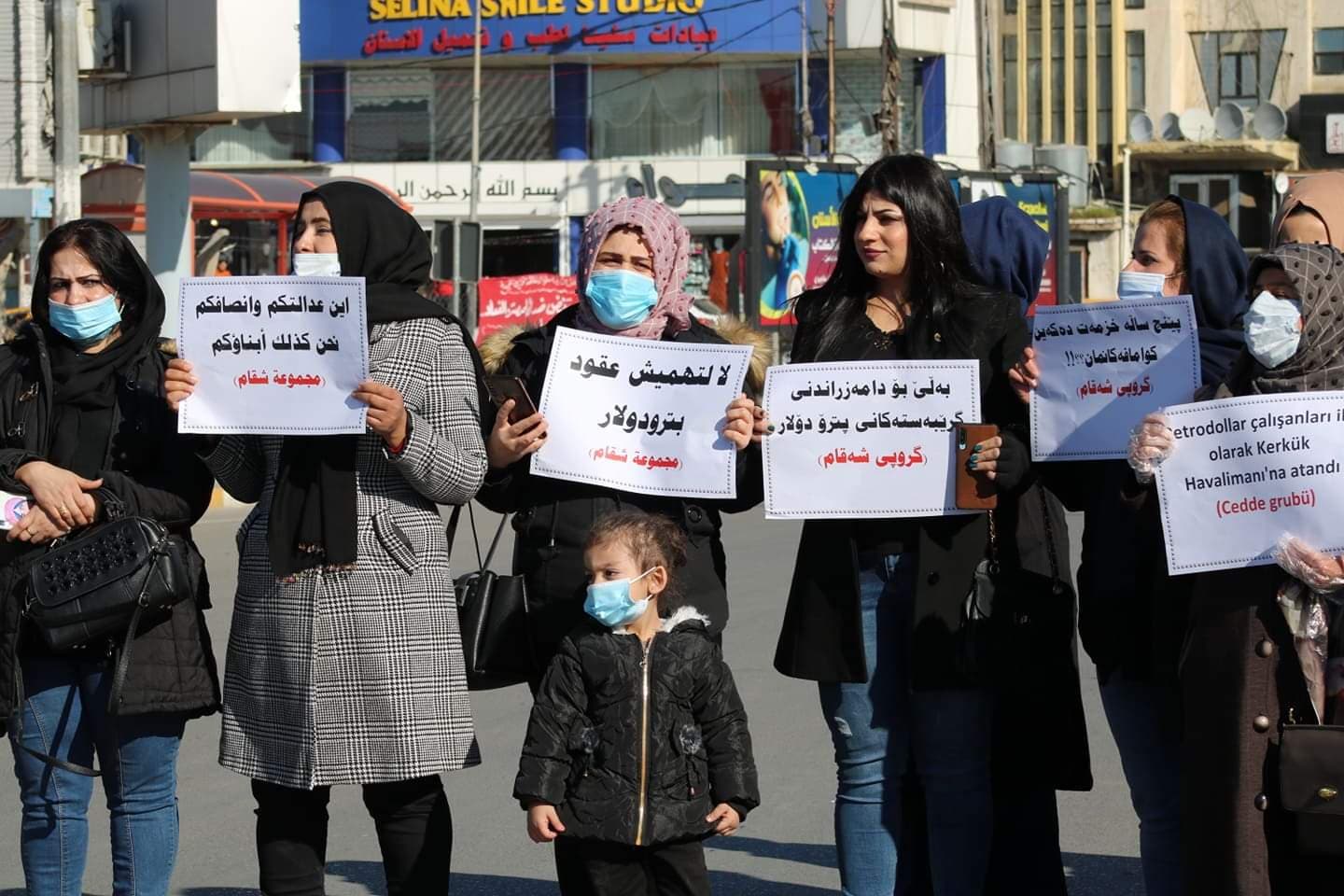A small number of Kirkukis take to the streets when there are calls for protests on social media platforms, where it largely hailed, against absence of proper public services in the oil-rich city.
On May 19th, only 50 people gathered calling for proper public services in the crowded bazaar of the Kurdish-dominant neighborhood of Rahimawa.
That was the last public demonstration which was warmly welcomed on Facebook for a week via different pages for activist groups and received tens of likes and positive supportive comments.
A vide of the protest shared live by KirkukNow have been seen by almost 8,000 people.
“I am really sorry because tens of thousands should have participated from all classes, civil servants, women and young people for their welfare,” said Yassin Fakhradin, a Kirkuki who participates in most of the demonstrations.
Fakhradin is angry of the low turnout by the locals in the civil activities to ask for their rights while public service is a need for all components, overlooking the sects and the classes.
He recalls how piles of garbage accumulated all over the city while people are keeping silent. The issue of garbage collection in Kirkuk is few years old and the local authorities blame absence of adequate budget yet few numbers of people joined the protests asking for tidiness.
Following the military defeat of the Islamic State in Iraq and Syria ISIS, discord over security arrangements, public services, and the lack of a unified administration in the disputed territories, have plagued victims and survivors.
The political tension between Baghdad and Erbil left Kirkuk and the disputed territories missing the basic public services. Garbage collection is one of the main challenges for people in their daily life in the last years in particular. Power shortage is blamed for low supply by Baghdad compared to the high demand by people for consumption.
Unemployment, poverty, and poor services of water and power supply are the main challenges the current Iraqi government could not handle
The northern oil-rich city of Kirkuk, Iraq's second largest oil reserves, is ethnically a mixed province for 1.2 million Kurds, Arabs, and Turkmen. It has long been at the center of disputes between Baghdad and the autonomous Kurdistan Regional Government KRG.
Ali Abdullah, a civil activist in Kirkuk and organizer of a number of protests, blames the political parties for playing no role in leading the protests.
“Why the parties and the authorities do not lead the public and Kirkuki street? When people keep silent, the results are clear like piles of waste.”
Abdullah says people are fed up of useless protests and empty words by the officials without putting an end to the miseries.
In May, several gatherings for different purposes such as short hours of national power supply, costs of private power supply, curfew due to Covid-19, unemployment and untidiness. were organized yet in none the participants have passed 100 people.
Abdullah believes people were intimidated under the former regimes and still fear aggressive response and crackdown by the security forces.
“Under the role of the Patriotic Union of Kurdistan PUK and the Kurdistan Democratic Party KDP, people were intimidated and following their departure, their rivalry over Kirkuk discouraged people to take to the streets.”
“People paid sacrifices, intimidated and can’t ask for their basic rights,” he added.
The Kurdish Peshmerga controlling Kirkuk since 2003 when Saddam Hussein regime was toppled, have marched toward the disputed territories following retreat of Iraqi forces in the face of IS militants in 2014.
The Iraqi government have announced the defeat of IS in 2017 and implemented law enforcement operation to retake control of the disputed territories in response to a referendum for independence by the Kurds, pushing the Peshmerga back to its bases ahead of 2014.
“Unfortunately, our calls are on Facebook and social platforms where we are heroes but the lions whom joined the field protest are few and countable.”
Currently, Iraqi army, local and federal police, Brigade 61 of Special Forces along with PMF, are under Kirkuk joint operations’ command, an umbrella for security forces running the security of Kirkuk.
According to the Iraqi constitution, peaceful demonstrations are allowed per law and public norms. Besides, an order by the coalition provisional authority CPA in 2003, following the topple of Saddam Hussein regime, the right of demonstration was organized.
A draft of demonstration right is at the Iraqi parliament yet have not been endorsed up today.

Kirkuk, February 2021- Demonstration by Shaqam (The Street) Group in front of Kirkuk Governor office to protest poor power supply. Photo by KirkukNow.
“Unfortunately, our calls are on Facebook and social platforms where we are heroes but the lions whom joined the field protest are few and countable.”
Several groups in Kirkuk were formed in Kirkuk occasionally calling for demonstrations to advocate for the basic rights of people via social media and personal relations.
Abdullah recalls he has called for Rahimawa gathering more than a week on Facebook. “Absence of electricity and water is not a problem? We are not all touched by it?” he angrily said.
“Kurds, Arabs, Turkmens and Christians live in Kirkuk so why we all together don’t try to rebuild this city? Let us be find a solution for tidiness, electricity and clean water by a strong fist and one call for our rights.”





